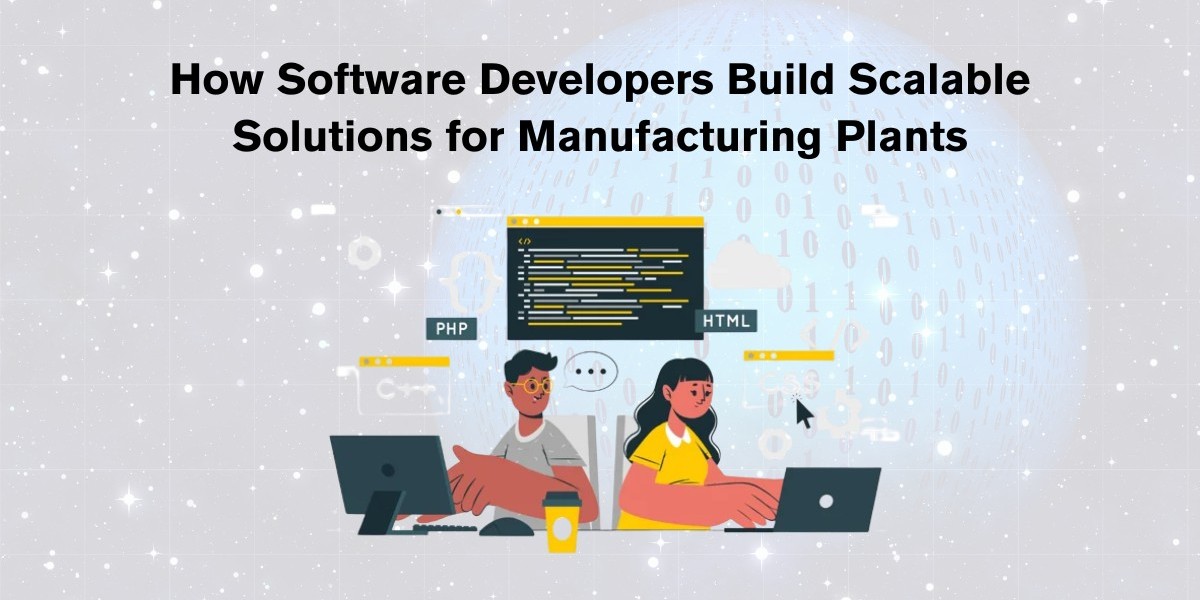Manufacturing plants today face increasing pressure to improve productivity, reduce costs, and respond quickly to market changes. Software plays a critical role in achieving these goals by automating processes, collecting real-time data, and supporting decision-making. However, not all software solutions can handle the complex and evolving needs of large-scale manufacturing operations.
Understanding Scalability in Manufacturing Software
Scalability means the software can handle growth smoothly — whether it’s increased data volume, user numbers, or complexity of operations. For manufacturing plants, scalable software must support:
Real-time Monitoring of Thousands of Machines and Sensors
Scalable manufacturing software collects and processes data continuously from thousands of machines and sensors, enabling instant detection of faults and operational status updates to support timely decision-making.Integration with Diverse Hardware and Legacy Systems
Manufacturing software connects modern IoT devices and older legacy systems through APIs and middleware, ensuring seamless data flow and unified control despite differences in technology and protocols.Complex Workflows Involving Multiple Departments
The software manages workflows that span production, quality control, supply chain, and maintenance teams, coordinating tasks and data across departments to optimize overall plant performance.Data Analytics and Reporting for Large Datasets
Manufacturing software processes vast volumes of operational data using big data tools and analytics, providing detailed reports and insights to guide strategic planning and process improvements.Secure and Role-Based Access for Various Users
The system enforces security by assigning role-based permissions, ensuring users access only necessary data and functions. This protects sensitive information and supports compliance with industry regulations.
Without scalability, software risks slowing down or failing as plants expand or new requirements emerge.
Architectural Principles for Scalable Manufacturing Software
1. Modular Design
Developers use modular architecture to separate software into independent components or services. Each module handles specific functions such as inventory, production scheduling, or quality control. This separation simplifies maintenance and allows scaling specific modules without affecting the whole system.
2. Microservices Architecture
Microservices break the application into small, loosely coupled services that communicate over APIs. This approach improves scalability because services can be deployed, updated, and scaled independently. For example, the inventory service can be scaled separately during peak demand periods.
3. Cloud-Native Solutions
Cloud platforms like AWS, Azure, and Google Cloud provide scalable infrastructure on demand. Manufacturing software developed as cloud-native applications can dynamically allocate resources based on usage. This eliminates hardware constraints and supports global operations.
4. Event-Driven Architecture
Manufacturing plants generate continuous data streams from sensors and machines. Event-driven architecture processes these real-time events efficiently by reacting to changes instantly. This approach supports high throughput and low latency, critical for monitoring and controlling production.
Technologies Used in Scalable Manufacturing Software
1. IoT Integration
Internet of Things (IoT) devices are widely used in manufacturing to collect data from equipment. Software developers build scalable systems that ingest large volumes of IoT data using protocols like MQTT and CoAP. Data pipelines process and analyze this data for predictive maintenance and operational insights.
2. Containerization and Orchestration
Containers (e.g., Docker) package software into isolated units that run consistently across environments. Orchestration tools like Kubernetes manage container deployment, scaling, and resilience. These technologies support efficient resource use and rapid scaling of manufacturing software components.
3. Big Data and Analytics Platforms
Manufacturing software integrates with big data technologies such as Apache Hadoop, Spark, or cloud-native data lakes to handle massive datasets. Advanced analytics, including machine learning, require scalable compute resources to process production data and generate actionable insights.
4. APIs and Middleware
APIs enable integration with ERP, MES, SCADA, and legacy systems common in manufacturing plants. Middleware platforms handle communication, data transformation, and security, supporting seamless interaction between various software components and hardware devices.
Software Development Practices for Scalability
1. Agile and Iterative Development
Agile methodologies promote incremental delivery and continuous feedback, allowing developers to adapt solutions as manufacturing needs evolve. Iterative development ensures scalability features are integrated from early stages and refined based on user input.
2. Automated Testing and Continuous Integration
Automated tests verify that new code does not degrade system performance or cause errors. Continuous integration (CI) pipelines run these tests regularly, enabling safe and fast deployment of updates without disrupting manufacturing operations.
3. Performance Monitoring and Optimization
Monitoring tools track software response times, resource usage, and error rates in real-time. Developers use these metrics to optimize code, balance loads, and prevent bottlenecks, ensuring consistent performance as usage grows.
4. Security by Design
Scalable manufacturing software handles sensitive data and controls critical processes. Security is integrated at every stage with role-based access, encryption, and audit logging. This protects the plant from cyber threats while supporting scalability.
Examples of Scalable Manufacturing Software Solutions
1. Real-Time Production Monitoring System
A Manufacturing Software Development Company built a system that monitors thousands of machines across multiple plants in real-time. The software uses microservices and event-driven design to process data streams and provide instant alerts for equipment failures. As plant operations grow, the system scales by adding more service instances automatically via cloud infrastructure.
2. Predictive Maintenance Platform
Developers created a predictive maintenance platform that collects sensor data and applies machine learning models to forecast equipment failures. The software runs on containerized microservices and integrates with existing MES and ERP systems. The platform scales to handle additional equipment and incorporates new algorithms without downtime.
Benefits of Scalable Manufacturing Software
Improved Operational Efficiency: Real-time data and automation reduce downtime and optimize production.
Cost Savings: Cloud infrastructure and modular software reduce hardware costs and simplify maintenance.
Business Agility: Scalable solutions support rapid introduction of new products or processes.
Future-Proofing: The software adapts to growth and technological advancements, protecting investment.
Enhanced Collaboration: Integrated systems facilitate communication between departments and sites.
Challenges and Solutions in Developing Scalable Manufacturing Software
1. Legacy System Integration
Many manufacturing plants rely on legacy hardware and software. Developers address this by creating middleware and APIs to bridge old and new systems, ensuring smooth data exchange without disrupting existing processes.
2. Data Volume and Velocity
High volumes of data from IoT devices can overwhelm systems. Implementing edge computing to pre-process data near the source reduces load on central servers and improves responsiveness.
3. Customization and Flexibility
Plants have unique workflows requiring tailored software. Using configurable modules and microservices allows developers to customize features without extensive rework.
Conclusion
Building scalable software for manufacturing plants demands a thorough understanding of industrial processes, software architecture, and modern technologies. A skilled Manufacturing Software Development Company applies modular design, cloud-native technologies, and agile practices to deliver solutions that grow with the business.
Scalable manufacturing software not only improves operational efficiency but also future-proofs plants against evolving market and technological demands. As manufacturing continues to embrace digital transformation, scalable software development will remain a critical factor in driving success.
































